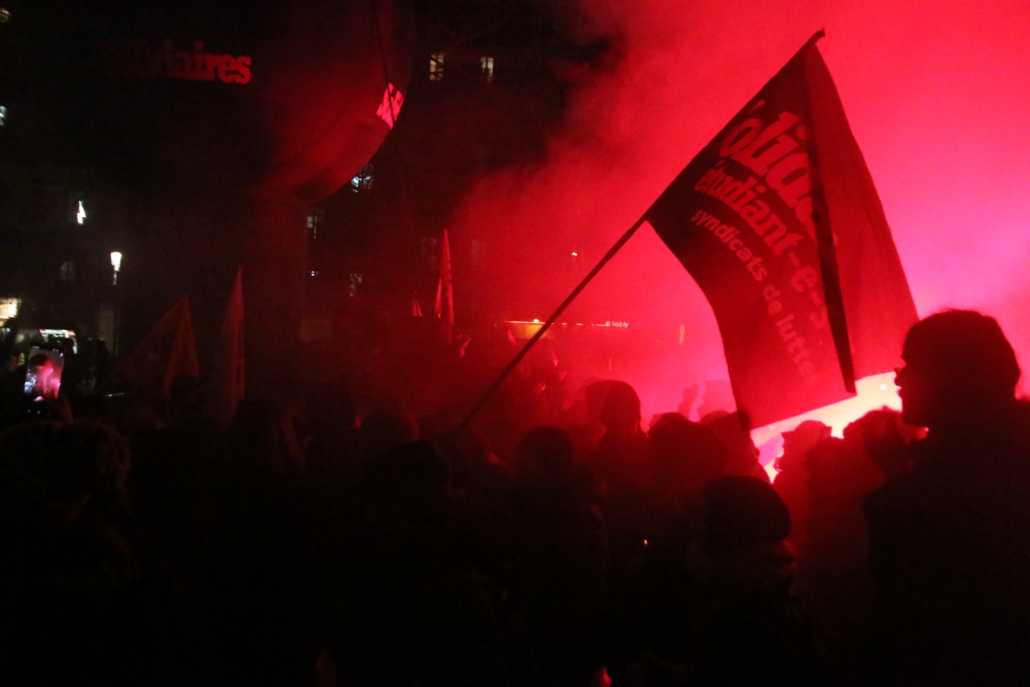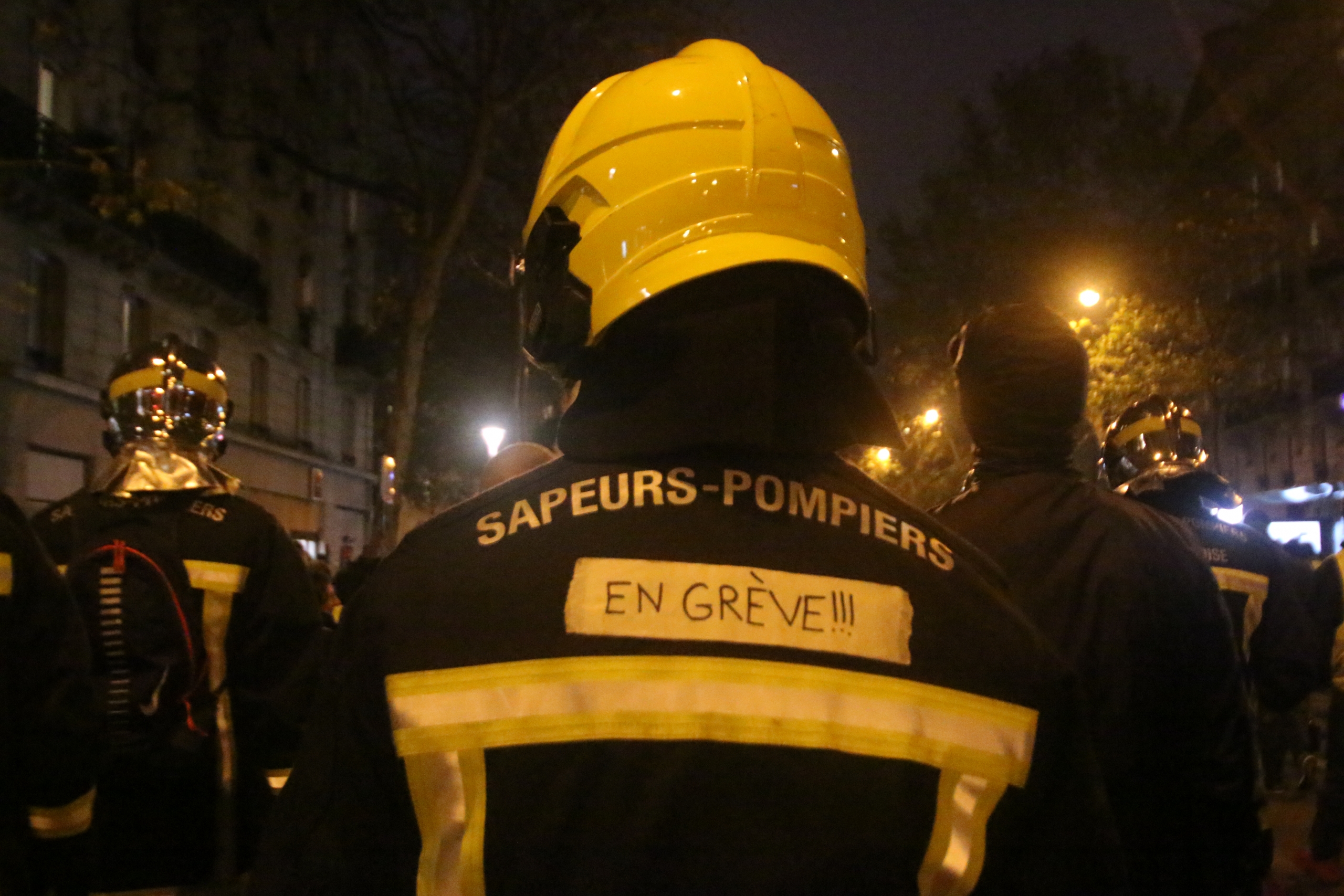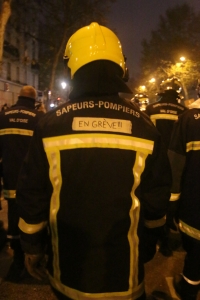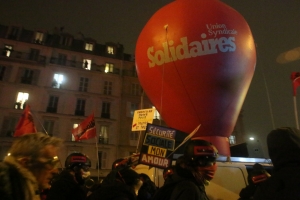France Strikes, with Firefighters at Center Stage

Visitors gather around the fire at the Pompiers protest camp in La République, Wednesday, December 4th.

On the side of one of their three tents, French Firefighters have a special badge reading Sapeurs-Pompier En Grève, “Firefighters On Strike” in English
Few protest camps were as unusual as the one on Place de la République this week. On Wednesday night the Sapeurs-Pompiers (French for Firefighters) gathered around a fire in front of their tents on the old and famous la République, where they had set up on Monday. Around 15-20 were sleeping on site, and a changing cast of twenty or so more visitors, including me and my translator, were stopping by to chat with them.
They are camping until Friday, and like many of their colleagues, they were getting ready for the general strike and protest that happened today in cities all around France. They were dressed in their firefighting gear, good enough protection against the biting cold of the Parisian winter. The pompiers were all smiles, brewing fresh coffee and chatting with passersby. Two were even happy to try out their English with an American, before giving up and just talking to my translator. “It’s about the cost, the money,” Claire, a pompier from Nice, said to me, before reverting to French. In translation, Claire and another companion who didn’t give her name continued: the Pompiers pay more into their pensions because their job is high risk, and because they have to retire earlier than most other professions due to the harshness of the job on their bodies. But Macron’s plan to reform the pension system threatened them, potentially with less benefits or a later retirement age, and they wouldn’t have it. Pompiers all over France wouldn’t have it, along with train workers, nurses, doctors, teachers, and so on.
The trains aren’t running, nor is the Paris Metro, hospitals are on skeleton crews, the firefighters were on the streets of Paris instead of in their firehouses, with what felt like everyone else in the world also on the streets of Paris, if you were trying to get through the crowd. One of the biggest strikes in recent French history was accompanied by one of the largest protests since a similar effort to reform pensions in 1995. The presence of the firefighters in the crowd was electric. They were the heroes of the day, people sang to them, the police mostly avoided tangling with them. At one point, when a group stopped to wait for other pompiers to catch up, a nearby group of perimeter police quickly put on their riot helmets.
The crowd was estimated between 800,000 (Traditional police lowballing) and 1.5 million (Traditional organizer highballing). Let’s say 1.1 million, because the journalist normally just picks a number between them, and the fact is no one ever actually knows how many people are protesting. The germane answer is: a lot. Life in France was largely put on hold, as the unions engaged in France’s true national sport.
French unions consist of five major confederations of trade unions that represent most union workers and negotiate directly with the government, as wells as other smaller unions that represent a wide range of mostly public sector workers, as well as political positions from centrists to anarcho-syndicalists. But the unions only represent about 11% of France’s workers as of 2013, down from about 30% in the 1950s. Everyone else grumbles these union workers have it much better than the rest of France, and that they strike and complain too much.
This position seems to be stated by many of the non-unionized French workforce without a hint of irony or self-reflection. France is a country where the few protect the rights and social safety net of the greater number, while pissing off absolutely everyone.
What has prompted them this time is the deeply unpopular President Macron’s amorphous and secretive plan to reform and combine French pension programs to streamline them and save money as they start to head into the red in the coming years. Macron’s administration has tried to say soothing things about their plan, and involve the unions in the process, but no one in France trusts Macron’s administration as far as they could throw the Élysée Palace. He consistently polls less popular with the French than Trump is with Americans, and that’s not easy to do. He also tends to act like he’s a petulant little king of France, an attitude that’s given rise to a lot of protests, walk outs, and political quagmires, of which the leaderless Gilets Jaunes (Yellow vests) movement is only the most famous example.
At the same time Macron is trying to assure everyone things will be alright and they can put their retiring livelihoods into his profoundly neoliberal hands, his administration sent the police unions a letter saying police pensions would remain unchanged by the government, whatever happened to anyone else. If there was one lesson the Roman emperors who once held Gaul passed on to their successors it was pay the people who fight for you, and pay them well. Macron claims not to be an autocrat, but he sure pays his muscle like one.
This strike is now ongoing, and having caught one of the last trains to Paris, I appear to be staying for a while. Words and pictures to follow, and I have more details and pictures in this Twitter thread.

As the last of the unions enter Place de la Nation, it turned into a bit of a dance party complete with Algerian Hip Hop.
My work for Emptywheel is supported by my wonderful patrons on Patreon. You can find out more, and support my work, at Patreon.








Excellent writing. I would not have guessed you needed a translator. You catch in a nutshell a normally opaque-to-Americans vignette of French labor culture and an important criticism of Macron’s neoliberal priorities, which are usually lost in the press’s obsession with his spouse.
You illustrate nicely the danger of Macron’s pension reforms. His “promise” to police unions that they and their would be monopoly on the use of force are thspecial: their pensions would remain unchanged, while others are handed to the neoliberal banksters. I hear an imperial twang there of divide and conquer. I hope the French see the societal harm to Macron’s proposed reforms from a kilometer away.
Macron is attempting to do in France what Margaret Thatcher achieved in Britain in the 1980’s – to smash the power of workers to defend themselves.
In the UK then, Thatcher’s targets were the coal miners. The UK government picked the fight carefully. Coal was quietly purchased from foreign markets, shipped to the UK and stock-piled. Then as now, police were treated incredibly well, with massive amounts of overtime and quick promotions for the willing. A massive propaganda campaign was used, with carefully-edited film footage of violence between police and strikers leading the news for night after night.
At the start of the 1980s miners strike, public sentiment was strongly behind them. After a couple of months of propaganda not only were the miners portrayed as militant subversives in the minds of the general public, but the government had succeeded in delivering a “Something must be done!” Sentiment in the minds of the public that gave them the platform to introduce sweeping laws that essentially broke the power of the unions. All unions.
In France, today, Macron faces pressure because of the sluggish EU economy and because of the relatively high percentage of French workers that are employed today by the public sector.
It looks very much as though Macron has been put in place to be “France’s Thatcher”, something that should make the French people nervous.
Dr. Timothy Morgon, the proprietor of surplusenergyeconomics.wordpress.com, has analyzed the cause of said strife and it is really about decline in prosperity due to the increase in the energy cost of energy (ECoE), but alas the public believes in perpetual growth on a finite planet. This too shall pass….. The following is just a paragraph from his latest analysis.
“The sharp fall in prosperity has created significant acquiescence risk, meaning that public support for economic and financial policy initiatives can no longer be taken for granted. The decrease in discretionary prosperity over the past ten years hasn’t been as severe in Britain as in France (-29.3%), but, at -20.9% the United Kingdom ranks third out of the 30 countries modeled by SEEDS, just behind second-ranked Denmark (-23.4%), just ahead of the Netherlands (-20.7%) and Australia (-20.6%), and a long way ahead of Canada (-16.6%), Japan (-14.1%), Italy (-13.6%) and the United States (-12.9%).”
Energy prices are one of many costs, though perhaps the most volatile.
It is Wall Street, the City, and so on, which demand perpetual growth. Capitalism is built on excess, and on externalizing its costs so as to maximize firm profits at the expense of society at large.
The “great and observant public” is more concerned with jobs, health care, education, and basic services, such as clean water. They care when “economic and financial policy initiatives” threaten those things. They care when Macron appears to put the interests of finance capital over their own, and threatens old-age income to improve finance capital’s rate of return.
Hmm, I was demonstrating yesterday, and yet I do not think that Macron isn’t France’s Thatcher. Nor that he and his government are the new incarnation of the Chicago Boys neoliberalism that fascinated the right for decades.
I having lived in the US, the UK and France for long periods of time, it is clear that the “contrat social” isn’t the same. And Macron was elected by the left against the right wing (in the first round) precisely because he acknowledged this. He is a man from the right, no doubt. But in any other country, he would be deemed center left.
…do not think that Macron is France’s … (sorry, somehow the edit button hasn’t appeared)
Thanks for the report. And, yeah, Macron isn’t from the right exactly…
It reminds me of a polish joke from back in the days of solidarnosc. One polish worker says to another.
“You hear about the American labor movement? They only strike one industry at a time.”
I wish Americans would have a nationwide strike against Trump&co.
Qn,
Excellent synopsis. Thank you. Happy the transport workers will extend your stay. Looking forward to your sharing the news shoulder to shoulder from the streets.
Great writing, and glad to see this here!
QN’s reporting stands up well compared to this Agence France-Presse report, reprinted at Raw Story. An otherwise useful story is littered with tidbits like this: “The walkout is the latest test of Macron’s mettle.”
The mano a mano personalization attempts to characterizes this conflict as a bullfight: a lone man’s courage against a raging animal. Mais non. This fight is a persistent conflict between French workers and their president’s neoliberal priorities.
Macron wants to lower finance capital’s risks by cutting old age pensions. He is attacking the weak to protect the strong. He is also cutting wages, since retirement is paid for by defering a portion of today’s wages until tomorrow. That perspective makes it a lot harder to cheer for the guy in tights and not the bull.
https://www.rawstory.com/2019/12/no-let-up-in-french-strikes-as-fresh-turmoil-hits-weekend/
This is too lazy. The retirement funds works as follows, for now:
— one account, B, is industries, companies etc. Managed by bosses union and workers unions 50/50.
— one account, I, is independents: artisan, shopkeepers, and now deliveroo bikers, Uber eats etc.
— one Account, S, is state employees and local authorities.
— many Other much smaller accounts, X, are railways, metro, etc.
The reform is to merge them into one. Account B was reformed 15 years ago and is now running a surplus, 120B. Most of the others are in the red. The first purpose of the reform is to help the state pay the other accounts with account B. So that the people “owning” B agree, and the whole system is balanced, adjustments are made. Macron is get far from retirement age, and the system will have imploded by then if nothing happens.
That does not mean that there is no room for improvements, but it isn’t a cynical pro business anti state move.
Too lazy by half perhaps. Or is it nonsense on stilts. You simply list different forms of pension schemes and conclude that Macron wants to rationalize them. A more important question is using what priorities and to what end.
Macron is a former investment banker. His apparent pension policies favor lowering costs to employers and the state by delaying retirement and reducing payouts. It’s hard to tell because he hasn’t published further details.
If all Macron wanted to do was to tap an apparently large reserve in one pension scheme to subsidize others, he might start there. But he seems considerably more ambitious.
His plans would appear to reduce union power in several ways. He would atomize negotiations by allowing firms to negotiate with smaller groups of workers rather than a national union. That shifts power to the employer.
He would remove judicial restrictions on making workers redundant by allowing judges to consider only the profitability of French rather than global operations. A slight familiarity with transfer pricing would suggest how easily that could be manipulated by large firms in favor of cutting French staff.
He would give industry or professional sectors the authority to agree on standard terms for much abused short-term labor contracts. These are now set by legislation. That, too, shifts power toward employers.
Macron would “simplify” French rules mandating payouts for wrongful discharge, another area employers manipulate. Macron says he wants to make them more predictable for employers. From a banker or politician, that usually translates into lowering them.
For comparison, French provisions are generous to the employee. That is both a cardinal sin and incomprehensible to US employers, which prefer to have the unrestricted right to fire their workers with no or minimal compensation. The Orwellian named legislation that permits that is called, “right to work.”
There is considerable reason to reform French labor practices. But there is much reason for labor to disagree with Macron’s priorities in doing so.
I *think* you’re confusing right to work, which destroys/prevents unionization with at-will work, which allows firing for any reason.
I did. For purposes of this comment, France and most of Europe have prohibitions against a broad array of unfair dismissals of employees, the opposite of US practice. They impose sanctions (and payouts to employees), which increase depending on how egregious is the firing.
The process for determining whether the dismissal is unfair is not controlled by the employer. It is considered a social as well as an economic policy, again, unlike the US. Neoliberal policies tend to be based or best expressed on US practice.
I do think he’s continuing something more than doing a new thing, Sarkozy et al kept trying to break the unions and the social services — the main difference I see is that Macron protests to not be left or right, socialist or conservative, and the French still don’t entirely know to what to make of that.
Monsieur Macron is an ex-investment banker. A friend who is an ex-pat from France described him to me as a “piece of dirt.” I’m sure in the original French it is more expressive. He also said that an investigative book had revealed that Macron was the hand-picked candidate of the French elite – who support him wholeheartedly.
My recollection is that when he was elected, it was a record low turnout, and his popularity quickly plummeted. The Times ran a story this week on the fears of the workers who are in the streets. One man who works on the high-speed trains as a driver was detailing how high stress and risky his work is – for 1800 euros a month! Doesn’t sound like a lot of money to me considering the responsibility he carries.
Wow, there’s everything in this message: unreferenced sources that know-a-lot-trust-me-on-that, sweeping assumptions, elite bashing, strange distortion of electoral results, and then something from the Times. Oh well.
And your point?…
Given the author’s long-term association with members of the American alt-right, including her continued public defense of Stromfront’s web master I wouldn’t take a word she writes as anything other then neo-Nazi propaganda.
Pretty disappointing and not what I expected from Emptywheel.
I agree. I cancel my monthly paypal donation.
Who forced you to read it?
Shouting, “la trahison!” would have been more theatrical. We try to weev a little more nuance into our comments here.
I’ve been writing here for years, including about pacifism and weev, why on earth is this the article you want to abuse me over?
“Weev”. Lol.